Sonic the Hedgehog Triple Trouble (ソニック&テイルス2 Sonikku to Teirusu Tsū?, lit. "Sonic & Tails 2"), also simply known as Sonic Triple Trouble, is a platforming game in the Sonic the Hedgehog series for the Sega Game Gear. The game was first released on November 1994 and it was developed by Aspect and published by Sega. Unlike many Game Gear titles, official Master System port has never been released. Sonic Triple Trouble has many gameplay elements and power-ups that are previously seen in Sonic Chaos.
Sonic Triple Trouble follows Sonic's and Tails' adventure to gather six Chaos Emeralds before Dr. Robotnik manages to do so and involves two other adversaries, marking the first appearance of the semi-recurring character Nack the Weasel (later known as Fang the Sniper), and Knuckles' first appearance on handheld game. Like many other Sonic-themed Game Gear games, Sonic the Hedgehog Triple Trouble was re-released on numerous compilation titles or as unlockable game. The standalone game has been re-released on the Nintendo 3DS in March 2012.
Plot
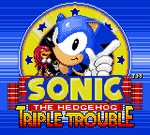
Title screen in the international version of Sonic Triple Trouble.
Dr. Robotnik has finally managed to get his mitts on six of the Chaos Emeralds without Sonic knowing. Unfortunately for him, an accident during the testing phase of one of his new weapons scatters the Emeralds. He managed to recover the yellow Emerald, but could not track down the other five. As he anticipated, Sonic and his buddy Tails are now out to retrieve them, so he once again tricks Knuckles into working for him.[1]
Meanwhile, a treasure hunter named Nack the Weasel has eavesdropped on the exchange between the hedgehog and the echidna. Unknown to them, he already discovered the Chaos Emeralds in his home dimension. Now Sonic and Tails must fend off Robotnik and Knuckles while retrieving the Emeralds back from Nack.[1]
In western instruction manuals, the storyline is slightly different in terms of characters' descriptions. In the western storyline, Knuckles has been tricked him into thinking that Sonic and Tails are out to steal the Chaos Emeralds and Nack is not aware of Chaos Emeralds' true power, but knows that they would likely fetch a high price on the market.[2]
Gameplay
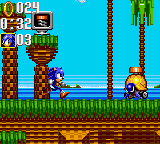
In-game screenshot from the Great Turquoise Zone, the first Zone in the game.
Sonic Triple Trouble is a 2D side-scrolling platforming game like many other Game Gear titles and their simply ports of the Sega Master System versions. The main goal is to reach the end of each Act of a Zone (a level in the game) within a time limit. Many gameplay elements from Sonic Chaos are featured. The player can choose one of two playable characters, Sonic and Tails, each of them having different abilities. The player starts the game with four lives and one Continue.
Abilities for both Sonic and Tails are relatively the same as in Sonic Chaos. Alongside the regular Spin Jump, Spin Attack and Spin Dash maneuvers, the player can perform both the Strike Dash for Sonic and the Heli-Tails for Tails. The game also introduces the one-time ability called Flying Spin Attack, which can be performed in the mid-air after bouncing on a Spring. The Flying Spin Attack is useful for attacking enemies below them or create protection from damage in mid-air.
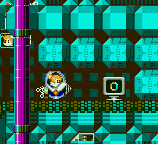
Tails piloting the Sea Fox, an exclusive item in Tidal Plant Zone.
Like in previous games, Rings are found everywhere in the Zones and protect the player from taking damage. Sonic the Hedgehog Triple Trouble is one of the first games in the series in which the player does not lose all Rings after getting hit; instead, only thirty Rings will be subtracted from the Ring total when the player gets hurt. The power-ups in the Monitors are mainly the same as in Sonic Chaos with Super Rings, Power Sneakers, Invincibility and extra lives. Like in Sonic the Hedgehog (8-bit), when losing a life, the player is sent back to the beginning of the Act or the latest opened Marker. As for Sonic and Tails, Monitors may also contain power-ups exclusive to them. Many of these include the returning Pogo Springs and Rocket Shoes from Sonic Chaos as well the new Hyper Heli-Tails, Jet Boards and Screw Shoes. In Tidal Plant Zone, Tails can also pilot the Sea Fox to travel through underwater sections without need for Air Bubbles.
The level design in Sonic the Hedgehog Triple Trouble is more extensive in size compared to previous Game Gear titles in the Sonic series and includes as well alternative pathways and secrets in each Zone, while staying much closer to the first main installments for the Sega Genesis. The Zones' astetics are similar those of the Sonic the Hedgehog 3 & Knuckles. Besides the traditional Springs and Boosters, each Zone features different types of gimmicks and contraptions.
Controls
| Button formation | Movement |
|---|---|
| Walking/Running | |
| Looking up | |
| Crouch | |
| Spin Jump | |
| Super Spin Attack | |
| Super Dash Attack | |
| Flying Spin Attack | |
| Strike Dash (Sonic only) | |
| Heli-Tails (Tails only) | |
| Spinning on the Spin Coaster | |
| Firing Sea Fox torpedoes (Tails only) | |
| Start button | Pauses the game. |
Objects
Items
- Rings
- Monitors
- Chaos Emeralds (Special Stages only)
Gimmicks and obstacles
|
|
Bonus Panel rewards
Like in Sonic Chaos, Bonus Panels at the end of the first two Acts will grant different type of items for the player after they stop spinning. Occasionally, the Bonus Panel will point backwards, meaning the player has to dash towards it to make spin it again.
| Dr. Robotnik | Sonic | Ring | Tails | Flicky | Knuckles | Emerald | Backwards |
|---|---|---|---|---|---|---|---|
10,000 points (Tails) |
10,000 points (Sonic) |
Other modes
The player can choose one of two other modes: Sound Test and Time Attack. Both modes are available on the game's title screen by pressing up and down on ![]() . Time Attack features a single, separated Act of the Great Turquoise Zone which lacks enemies, but also holds different gimmicks from in the game. Due the lack of battery backup of Game Gear games, none of the records made in Time Attack can be saved on the game's hardware. The Japanese release of the game features a "3D Stage" option to test run the second type of Special Stages.
. Time Attack features a single, separated Act of the Great Turquoise Zone which lacks enemies, but also holds different gimmicks from in the game. Due the lack of battery backup of Game Gear games, none of the records made in Time Attack can be saved on the game's hardware. The Japanese release of the game features a "3D Stage" option to test run the second type of Special Stages.
Appearances
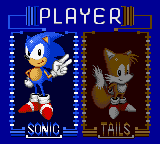
Character select menu.
Playable characters
Non-playable characters
Enemies
|
|
|
Bosses
- Marvelous Queen (Nack the Weasel) - Fought at the end of each Special Stage except the first.
- Tart Turtle
- Marve-shupopolous-gou
- Wood Buttarundorf
- Giga Thomas "Pen"
- Knuckles the Echidna (Tidal Plant Zone boss)
- Metal Sonic (Atomic Destroyer Zone sub-boss)
- Atomic Destroyer Zone bosses 1, 2 and 3 (Dr. Robotnik)
Zones
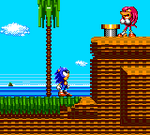
Knuckles, about to spring a trap on Sonic in Great Turquoise Zone.
Sonic Triple Trouble consists six Zones with three Acts each. The third Act is a short course, usually with a small cache of Rings followed by a boss. The zones' order are:
- Great Turquoise Zone
- Sunset Park Zone
- Meta Junglira Zone
- Robotnik Winter Zone
- Tidal Plant Zone
- Atomic Destroyer Zone
Special Stages
Additionally, and in keeping with the 8-bit tradition, there are five individual Special Stages in the game. Sonic the Hedgehog Triple Trouble, however, sees these stages accessed in a unique way: by collecting fifty Rings and breaking open the "Chaos Emerald" Monitor, a portal appears which leads to the Special Stage.
The first, third and fifth stages are giant mazes with a countdown timer. The timer can be boosted with "Time Bonus" items scattered throughout them, but it never exceeds one and a half minutes. The second and fourth Special Stages involve flying the Tornado to collect Rings and avoid bombs. At the end of every Special Stage, Nack shows up and attacks with one of the Marvelous Queen's weapons to protect the Chaos Emerald. Clearing all five Special Stages unlocks the "good" ending of the game.
Reception
The game received mixed to positive reviews during its release from many published video game magazines. Most of magazines such as GamePro, praised the game for graphics and new gameplay elements, though the game gets criticized for being too easy, reducing its longevity and slowdowns leading to cheap deaths.[3] Sega Saturn Magazines also concluded the game being enjoyable, but too easy. Mean Machines Sega magazine gave an score 85 out of 100 in December 1994 issue, praising for its graphics and gameplay.[4] The Japanese Famicom Tsūshin gave an score a 21 out of 40 for the game in the November 1994 issue.[5]
The reception towards the game in compilation an re-releases has been worse, as Eurogamer stating the game being poorly aged and "intolerable",[6] while Games Radar calls it "reasonably competent, but no less tedious".[7] As IGN stated it being as not "particularly stellar",[8] Gamespot critized the game for suffering the poor Game Gear emulation on Sonic Gems Collection release.[9] Nintendolife gave Nintendo 3DS re-release an score 6 out of 10, as praising solid level designs and graphics while criticizing the lack of challenge and sluggish pacing.[10]
Re-releases
Like other Game Gear games, Sonic Triple Trouble is featured on many re-releases and completion titles. It is featured as unlockable game after completing 160 missions in Sonic Adventure DX: Director's Cut for Nintendo GameCube and PC in 2003. The game is released in 2005 as part of the Sonic Gems Collection for the Gamecube and PlayStation 2.
Sonic Triple Trouble, along with 19 other Game Gear and Master System games, have also been released on the Coleco Sonic, handheld game console by Coleco in 2006. In March 2012 along with many Game Gear titles, Sonic Triple Trouble has been re-released on the Virtual Console of Nintendo 3DS with the price of 300 points.
Comic adaptation

The front cover of Archie Sonic the Hedgehog Triple Trouble.
The Sonic the Hedgehog comic series published by Archie Comics made a loose comic adaption based on the western storyline of the game. Released on August 1995, it is the third issue in Archie Comic's Sonic Special comic line published on every couple of months for two years. The comic adaption also introduced Nack the Weasel to the comic universe.
Cheat codes
- Level Select: Hold up on the
 while powering on the Game Gear. Continue to hold until Knuckles grabs the third Chaos Emerald in the intro, then press START and the Ring chime can be heard. Proceed through the title screen and character select screens to get hidden Level Select menu.
while powering on the Game Gear. Continue to hold until Knuckles grabs the third Chaos Emerald in the intro, then press START and the Ring chime can be heard. Proceed through the title screen and character select screens to get hidden Level Select menu.
Staff
- Producer: M.Hoko
- Director: Katsuhiro Hasegawa ("K. Hase")
- Staff: M.Sima, Nobuhiko Honda ("N.Honda"), Saori Kobayashi ("Saori.K"), Tadashi Ihoroi ("T.Ihoroi"), Shinichi Higashi ("S.Higasi"), O.Kodera, Toshiaki, K.Oikawa, H.Sai, Kojiro Mikusa ("K.Mixa"), Sukioka, Tatsuo Matsuda ("M.Tatsu"), Tomoko Sasaki ("Tomoko"), Fumi, Yoshiki Ooka ("Yoshiki")
- Composer: Yayoi Wachi ("Yayoi.F")
- Thanks: H.Kojima, Y.Furuta, Hayato.T, N.Taidai, K.Unoki, Ray.F, James Spahn ("J.Spahn"), N.Katoh, R.Somaki, J.Misima, Y.Okitsu, T.Tanaka, Manabu.M and You
Trivia
- Sonic the Hedgehog Triple Trouble (Sonic & Tails 2 in Japan) is a sequel to Sonic Chaos (Sonic & Tails in Japan) in Japan. However, this was not emphasized outside of Japan due to the game's western names.
- Precisely where in Sonic's world the setting of Sonic Triple Trouble and all Zones are taken place is never stated in-game manuals in contrast to the previous 8-bit titles, Sonic the Hedgehog (8-bit), Sonic the Hedgehog 2 (8-bit), and Sonic Chaos, which were all categorically stated to take place on South Island. It may be that Sonic Triple Trouble takes place there as well; alternatively, due to the presence of Knuckles the Echidna, the game may be set on Angel Island, although it remains altogether possible that Triple Trouble is simply set in an unspecified region not previously visited by earlier Sonic games.
- As in western storyline of the game, Sonic Triple Trouble is one of games, that is mentioned to took place on Planet Mobius.[11] This was an early name given by Sega of America for Sonic's world, made popular in other media and originated from early western continuity.
- When the game was first previewed in an article, the game was gone under the name Sonic Chaos 2 and a new character was announced by the name of Jet, which was later found out to later be Nack.[12]
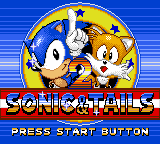
Title screen from Japanese version of the game.
- The localized, international version of the game in comparison to Japanese release is almost unaltered aside of name changes. Only notable differences are alternative title screen and the "3D Stage" option on it being removed, even though it is depicted in instruction manuals.
- Unlike the previous 8-bit entries, the game was primarily designed around the Game Gear hardware. The viewing area is thus much less of a problem, as the level design accommodates the smaller screen.
- The game bears some similarities to Sonic the Hedgehog 3, particularly how Knuckles appears at several points to hinder the player character. The game itself was originally released between Sonic the Hedgehog 3 and Sonic & Knuckles.
- Several game elements such as Strike Dash, glass balls in Meta Junglira Zone and inclusion of Metal Sonic are taken from Sonic the Hedgehog CD.
- The theme of Sunset Park Zone Act 3 is actually an unused track from Sonic Chaos except with a lower pitch.
- In Tidal Plant Zone, Tails can use a submarine Sea Fox, which would later appear as a transformation of the Remote Robot in Tails Adventure.
- This is the first time in which Sonic fights Metal Sonic rather than racing him in Sonic CD.
- In the "Special Thanks" section of the credits, an "H. Kojima" is credited. This may refer to Hideo Kojima, the famed creator of the Metal Gear series, although this is not confirmed and may be coincidental.
- The Adventures of Sonic the Hedgehog incarnation of Dr. Robotnik, originally designed by Milton Knight is seen on the North American and European front box cover. Milton's character design is heavily used for the character in many western promotional and game artorks during that time.
Videos
References
- ↑ 1.0 1.1 Sonic the Hedgehog Triple Trouble (Sega Game Gear) Japanese instruction manual pgs. 4-6.
- ↑ Sonic the Hedgehog Triple Trouble (Sega Game Gear) North American instruction manual pg. 2.
- ↑ ProReview: Sonic the Hedgehog Triple Trouble. International Data Group. November 1994. p. 206.
- ↑ Merrett, Steve; Bufton, Paul (December 1994). Game Gear Review: Sonic the Hedgehog Triple Trouble. EMAP. p. 108-109.
- ↑ NEW GAMES CROSS REVIEW: ソニック&テイルス2. Weekly Famicom Tsūshin. No.309. Pg.39. 11–18 November 1994.
- ↑ Bramwell, Tom (6 October 2005). Sonic Gems Collection Review • Reviews • GameCube •. Eurogamer.net. Retrieved on 10 October 2015.
- ↑ Elston, Brett . Sonic Gems Collection. GamesRadar. Retrieved on 10 October 2015.
- ↑ Sonic Gems Collection - IGN. Cube.ign.com. Retrieved on 10 October 2015.
- ↑ Sonic Gems Collection Review. GameSpot.com (16 September 2005). Retrieved on 10 October 2015.
- ↑ Dillard, Corbie (20 March 2012). Review: Sonic the Hedgehog: Triple Trouble (3DS eShop / GG). GameSpot.com. Retrieved on 10 October 2015.
- ↑ Sonic Triple Trouble (Sega Game Gear) North American instruction manual pg. 1.
- ↑ "Strangely Sonic". Mean Machines Sega. June 1994http://sost.emulationzone.org/sonic_tt/scans/mmsjune201994.jpg.
External links
- Sonic & Tails 2 at official minisite of Sonic Gems Collection (Japanese)
- Sonic & Tails 2 at official minisite of Nintendo 3DS re-release (Japanese)
- Sonic & Tails 2 at The GHZ
- Sonic the Hedgehog Triple Trouble at GameFAQs
- Sonic The Hedgehog Triple Trouble at SMS Power!


